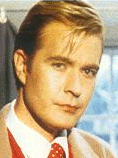- Year: 2000
- Album: Felt Mountain
 |
| Kylie v. Alison |
As for the best artist of this past decade – I’d probably go with Goldfrapp. Alison has a commanding voice (almost too rich for pop), and each song is painstakingly sonic-tuned by Will Gregory to an enveloping brilliance (I can think of no better material to test out a new set of woofers than “Koko” or “Strict Machine"). Yet, they never quite accomplished that perfect hit – one that no radio programmer, no matter how corrupt and jaded he may be, could ignore.
This years invigorating “I Wanna Life” comes close – with its springy, keyboard-laden sitcom theme-like chorus (And thankfully not one of Alison’s goofy stabs at eroticism). The ‘80s retro-trend is still going strong, but why, once again, has another Goldfrapp album been largely ignored?
Kylie, on the other hand, seems to have garnered unlimited mileage from her 1988 debut. While Goldfrapp vows to have never been inspired by anything post-1983, it still seems ironic that Kylie appears to now be aping them.
Sure, in the video for “Two Hearts,” Kylie’s writhing around on a piano, like some chanteuse you’d see on Turner Classic Movies, but her strained middle-aged sexuality, along with the glam rock posturing and piano-pounding rhythm from her band, seems very reminiscent of Supernature-era Golfrapp (a la “Ohh La La").
Goldfrapp was ahead of the ‘80s revival-curve, but with this year’s Head First, they’ve grabbed the burning rope of the retro-movement for dear life. Invoking campy space-aged atmospherics and Olivia Newton-John Xanaduesque fantasies – it’s a last ditch attempt to hijack the ride they helped to initiate.
But now it’s Kylie turn. In her recent “Better Than Today,” which – with the Pac-man masks, keytars, and pink lasers – she appears to be parodying the entire notion of geek nostalgia. Kylie going retro may just cause the fabric of space-time to collapse in on itself.
I empathize with those Goldrapp fans who long for the less complicated appeal of their debut album - 2000’s Felt Mountain. Upon first hearing it, my heart swelled in hope for the new millennium. While the singles where more subdued, light on the beats, and incorporated more classical instruments, lyrically they peered way into the future – where being “wired to the world” (as Alison coos in “Utopia”) could bring about a perpetual state of obedience and bliss.
But I can't imagine a more aurally scenic and soothing tune than “Pilots.” Here the airplane is the sensory-depravation chamber. When Alison thankfully observes “the sound of you and me,” she’s not referring to a human, but rather, the hum of “a friendly machine” – lulled to sleep in the warm womb of mother aircraft.
Thus, when Goldfrapp’s Black Cherry followed three years later, my reaction was bittersweet. As I respected the whole retro-thing and my head nodded to the beats, I felt the lush balladry deserved further exploration. It’s a shame that, someone more popular, like Kylie, hasn’t chosen to imitate the cinematic-orchestral sound of Felt Mountain instead.












































